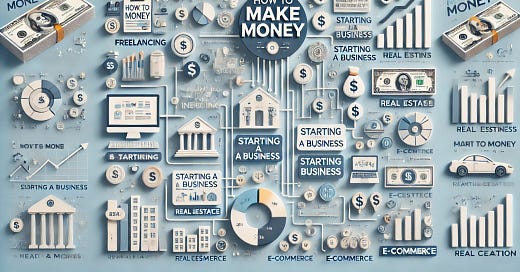How to Make Money with Event Planning
How to Make Money with Event Planning (Even If You’re Just Starting)
You’re here because you want to make money with event planning. Maybe you’ve thrown a few killer parties, organized a charity fundraiser, or just love bringing people together. Now, you’re wondering: Can I actually turn this into real cash?
Short answer? Hell yes.
But let’s cut the fluff—this isn’t about vague motivational advice. It’s about actionable steps to turn your event planning skills into a profitable hustle (or full-blown business).
Why Event Planning is a Goldmine
Before we dive into the how, let’s talk why:
High demand: People will always need events—weddings, corporate parties, birthdays, conferences.
Profit margins: Charge premium prices for your expertise.
Scalability: Start small, then expand into bigger gigs.
Low startup costs: No fancy degree needed—just hustle and know-how.
Now, let’s get into the real deal.
How to Make Money with Event Planning (Step-by-Step)
1. Pick Your Niche (Stop Trying to Do Everything)
Generalists get lost in the crowd. Specialists get paid.
Ask yourself:
What events do I enjoy most? (Weddings? Corporate retreats?)
What’s profitable in my area? (High-end weddings vs. startup networking events?)
Examples of profitable niches:
Wedding planning (Big budgets, emotional buyers)
Corporate events (Companies pay well for smooth execution)
Social media pop-up events (Brands love experiential marketing)
Nonprofit fundraisers (High-impact, networking goldmine)
Pro tip: Start with one niche, dominate it, then expand.
2. Build Your Credibility (Without Spending a Fortune)
You don’t need a fancy degree—just proof you can deliver.
How to build credibility fast:
Volunteer at local events (get experience + references).
Create a portfolio (even if it’s just mock-ups at first).
Get certified (cheap courses like Event Planning Certification help).
Leverage social proof (client testimonials, before/after pics).
3. Land Your First Paying Clients (No Cold Calling Needed)
Where to find clients:
Facebook Groups (Wedding planners, local business networks).
Instagram & TikTok (Post behind-the-scenes content).
Upwork & Thumbtack (Freelance gigs to start).
Local businesses (Offer to plan their next corporate event).
Script to close your first client:
"Hey [Name], I noticed you’re hosting [event]. I specialize in making these seamless and unforgettable. If you’re open to it, I’d love to help—let’s chat?"
4. Price for Profit (Stop Undercharging)
Newbies make one huge mistake: charging too little.
How to price your services:
Hourly rate:
50–50–
50–150/hr (for consulting).
Flat fee:
1,000–1,000–
1,000–10,000+ per event (depending on scale).
Percentage of budget: 10–20% (common for weddings).
Upsell add-ons:
Vendor commissions (get kickbacks from florists, photographers).
Day-of coordination (charge extra for last-minute help).
5. Scale Beyond Your Time (Make Money While You Sleep)
Ways to scale:
Sell templates (event checklists, planning guides on Etsy).
Create a course (teach others how to plan events).
Hire assistants (delegate tasks, take on more clients).
FAQs: Making Money with Event Planning
Q: Do I need a license to start an event planning business?
A: Most states don’t require one, but check local laws. Certifications help with credibility.
Q: How do I stand out from other planners?
A: Niche down, over-deliver, and market your unique angle (e.g., “Stress-Free Wedding Planning”).
Q: What’s the easiest event to start with?
A: Small social events (birthdays, baby showers)—lower stakes, great practice.
Q: How do I handle difficult clients?
A: Set clear contracts, charge deposits, and don’t tolerate abuse. Fire bad clients fast.
Final Tip: The Million-Dollar Mindset
Event planning isn’t just about logistics—it’s about selling an experience. The best planners don’t just organize; they make magic happen.
Want more money-making strategies? Check out MillionFormula.com for real-world business blueprints.
Bottom line: If you’re willing to hustle, niche down, and charge what you’re worth, event planning can be a lucrative career—not just a side gig.
Now go book your first paid client.



